Unit 8 We're trying tosave the earth! Section A Grammar Focus-4c课件(共30张PPT)
文档属性
| 名称 | Unit 8 We're trying tosave the earth! Section A Grammar Focus-4c课件(共30张PPT) |
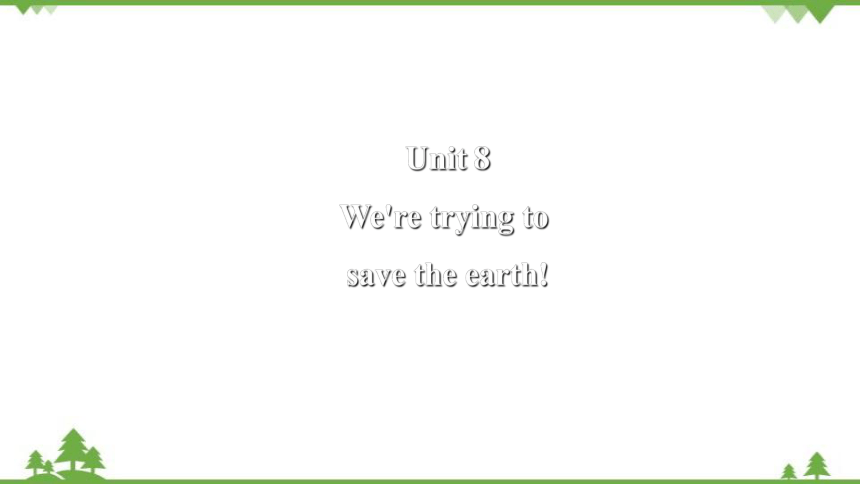
|
|
| 格式 | ppt | ||
| 文件大小 | 1.4MB | ||
| 资源类型 | 教案 | ||
| 版本资源 | 鲁教版 | ||
| 科目 | 英语 | ||
| 更新时间 | 2022-10-26 11:51:23 | ||
图片预览

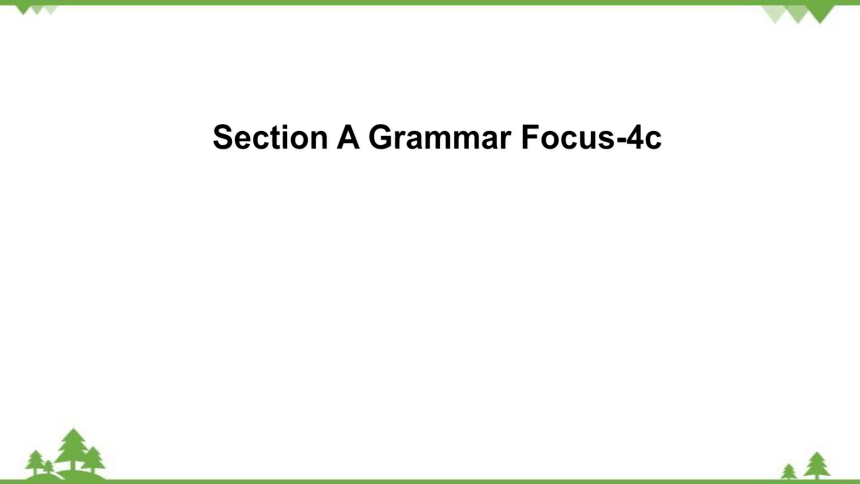
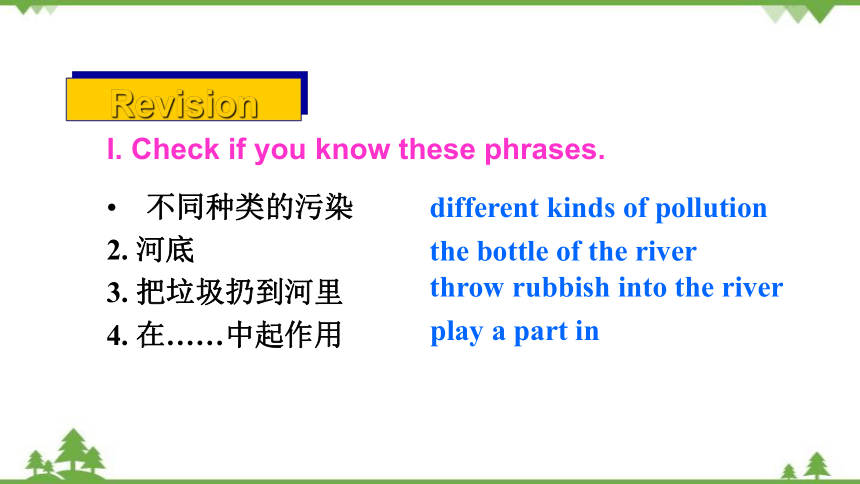
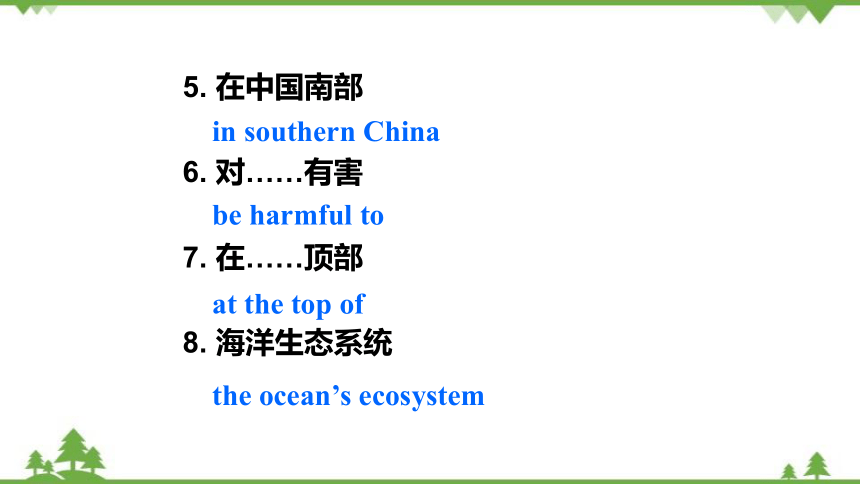
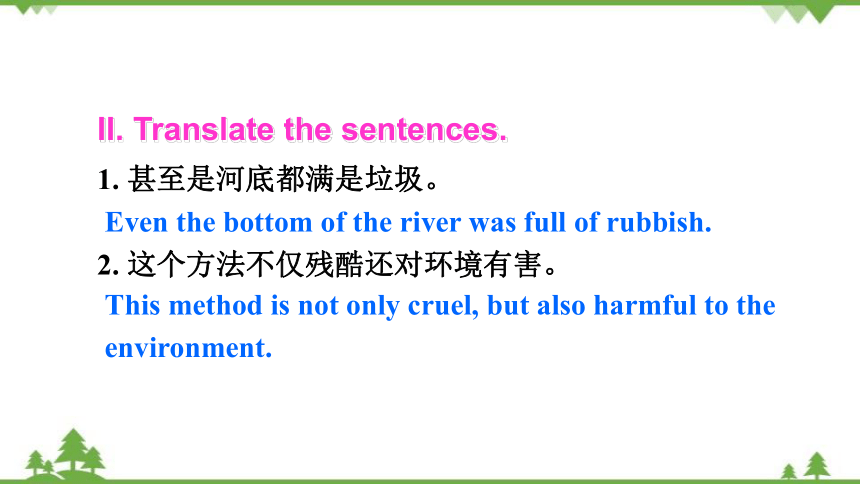
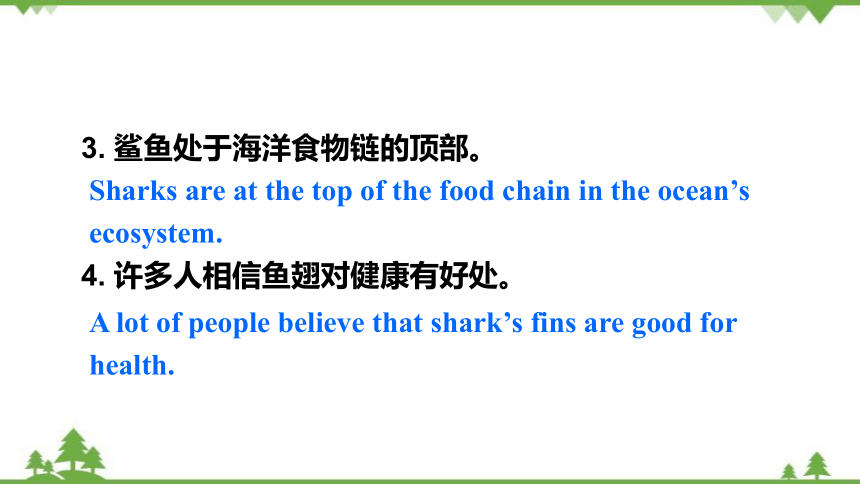
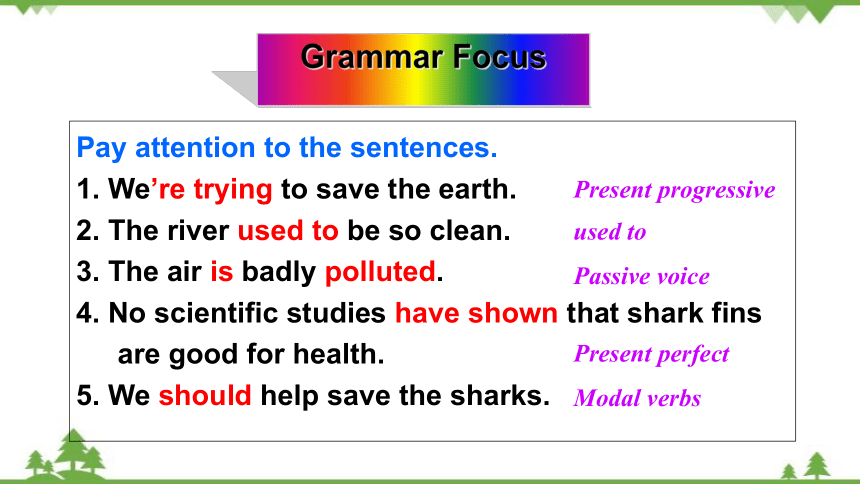
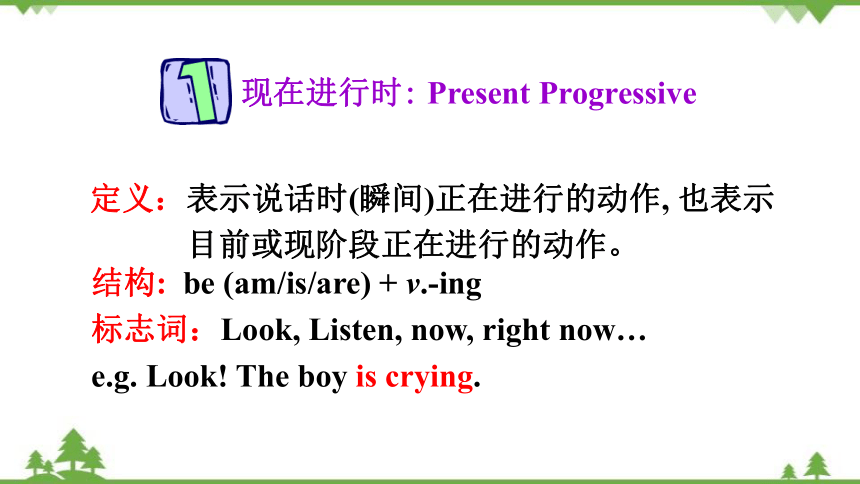
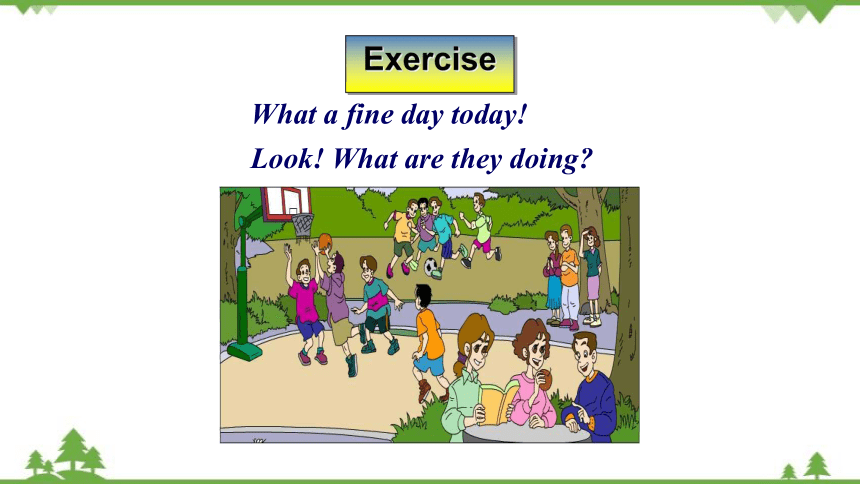
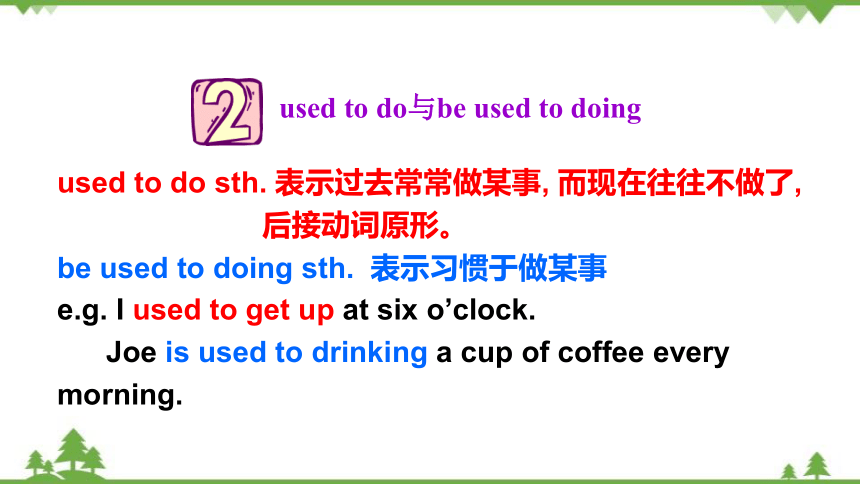
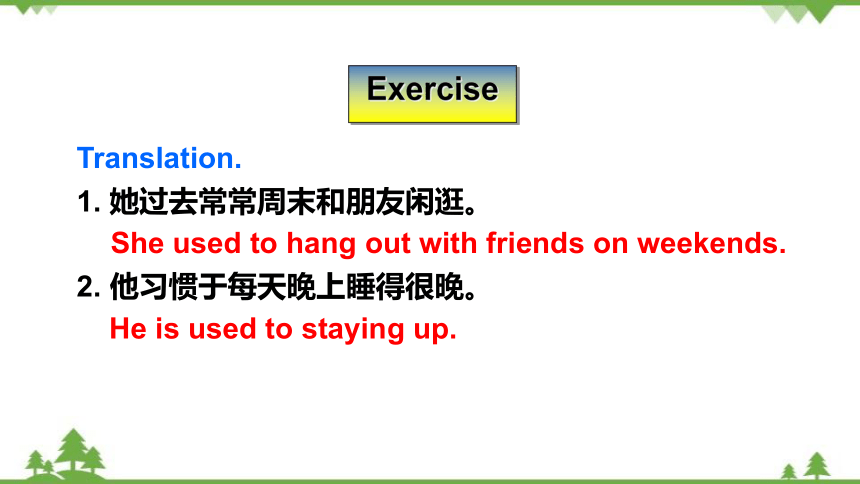
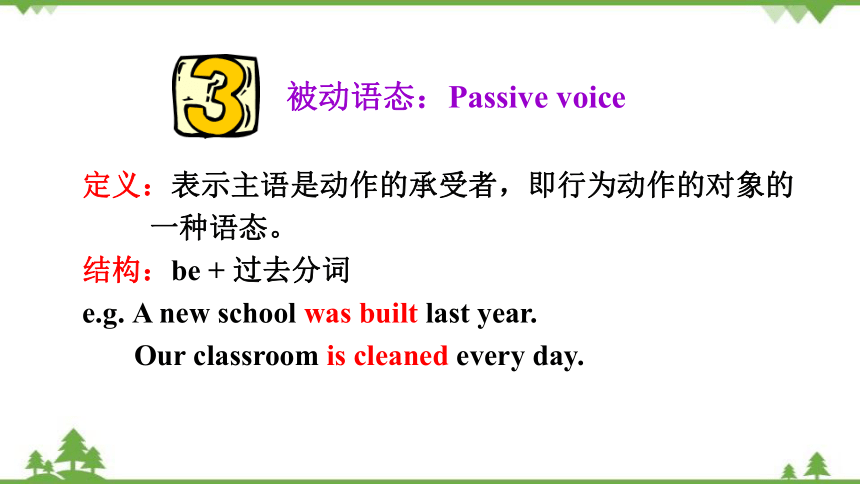
文档简介
(共30张PPT)
Unit 8
We're trying to
save the earth!
Section A Grammar Focus-4c
Revision
不同种类的污染
2. 河底
3. 把垃圾扔到河里
4. 在……中起作用
different kinds of pollution
the bottle of the river
throw rubbish into the river
play a part in
I. Check if you know these phrases.
5. 在中国南部
6. 对……有害
7. 在……顶部
8. 海洋生态系统
in southern China
be harmful to
at the top of
the ocean’s ecosystem
II. Translate the sentences.
1. 甚至是河底都满是垃圾。
2. 这个方法不仅残酷还对环境有害。
Even the bottom of the river was full of rubbish.
This method is not only cruel, but also harmful to the environment.
3. 鲨鱼处于海洋食物链的顶部。
4. 许多人相信鱼翅对健康有好处。
Sharks are at the top of the food chain in the ocean’s ecosystem.
A lot of people believe that shark’s fins are good for health.
Pay attention to the sentences.
1. We’re trying to save the earth.
2. The river used to be so clean.
3. The air is badly polluted.
4. No scientific studies have shown that shark fins are good for health.
5. We should help save the sharks.
Present progressive
used to
Passive voice
Present perfect
Grammar Focus
Modal verbs
现在进行时: Present Progressive
结构: be (am/is/are) + v.-ing
标志词:Look, Listen, now, right now…
e.g. Look! The boy is crying.
定义:表示说话时(瞬间)正在进行的动作, 也表示
目前或现阶段正在进行的动作。
What a fine day today!
Look! What are they doing
Exercise
used to do sth. 表示过去常常做某事, 而现在往往不做了,
后接动词原形。
be used to doing sth. 表示习惯于做某事
e.g. I used to get up at six o’clock.
Joe is used to drinking a cup of coffee every morning.
used to do与be used to doing
Translation.
1. 她过去常常周末和朋友闲逛。
She used to hang out with friends on weekends.
2. 他习惯于每天晚上睡得很晚。
He is used to staying up.
Exercise
被动语态:Passive voice
定义:表示主语是动作的承受者,即行为动作的对象的一种语态。
结构:be + 过去分词
e.g. A new school was built last year.
Our classroom is cleaned every day.
Translate the sentences by using Passive voice.
1. 刚才一些老年人参观了博物馆。
2. 工人们使用不同种类的机器工作。
The museum was visited by some old people just now.
Different kinds of machines are used to work by the workers.
Exercise
结构: has/have + 过去分词
标志词:already, yet, ever, never, since, for…
e.g. I haven’t finished my homework yet.
定义:表示动作已经完成, 但对现在造成影响; 或者
表示从过去某一时间开始一直延续到现在并
还可能持续下去的动作。
现在完成时: Present Perfect
Complete the following sentences.
I _________ (be) in Beijing for two years.
2. I _____ never _____ (hear) of that man before.
3. Tom __________ (work) there since two years ago.
have been
have
heard
has worked
Exercise
4. The twins ___________ (wash) the clothes for an hour.
5. He _________ (play) basketball since three years ago.
6. How long ____ Sally _____ (sing) yet
have washed
has played
has
sung
1. 情态动词本身有一定的词义, 表示说话人的情绪、态度或语气, 但不能单独作谓语, 只能与其他动词构成谓语。常见的有: can (could), may (might), must, need, shall (should), will (would)等。
情态动词
2. 情态动词无人称和数的变化, 后接动词原形。否定式是在情态动词后面加not。个别情态动词有过去式形式, 可用来表达更加客气、委婉的语气。
e.g. Ken can climb up the tress like a koala.
Tracy could ride a bicycle when she was five
years old.
You mustn’t play with fire. It is dangerous.
Translation.
1. 我们不能在教室里吃东西。
2. 首先你必须完成作业。
3. 他现在不可能在家。
4. 她一定知道这个问题的答案。
Exercise
We can’t eat in the classroom.
You must finish your homework first.
He can’t be at home now.
She must know the answer to this question.
Fill in the blanks with the correct forms of the verbs in brackets.
Joe: _____ you ever ______ (take) part in an
environmental project
Eric: Yes, I have. I ______ (help) with a Clean-Up
Day last year. It was __________ (consider) the
biggest clean-up project this city ____ ever
____ (have).
Have
taken
helped
considered
had
had
参加
4a
Joe: How many people ____ (take) part
Eric: I _____ (think) more than 1,000 people ______
(come) to help out.
Joe: That’s fantastic! I guess everyone in this city is
______ (try) to improve the environment.
Eric: Yes, we can’t afford to ____ (wait) any longer to
take action!
took
think
came
trying
wait
v. 承担得起(后果); 买得起
Fill in the blanks with the appropriate modal verbs from the box.
People __________ think that big things ______ be done to save the earth. Many forget that saving the earth begins with small things. For example, you ____ save
may/might
must
can
can would could
have to should must
may/ might
4b
electricity by turning off the lights when you leave a room. You ______ also use reusable bags instead of plastic bags. I think it’s a great idea that you now ______ pay for plastic bags in some stores. And instead of driving to school or work, you __________ ride your bike or walk. If it’s far, you __________ take the bus. All these
could
have to
can/should
can/could
关掉
adj.可重复使用的
付费;付出代价
small things ______ add up and become big things that _________ improve the environment. Let’s take action now!
could
would/can
采取行动
Make a list of things that people can do to help the environment and discuss your list with your partner.
use public transportation (n.交通运输);
turn off the lights when you leave a room;
use reusable bags instead of plastic bags;
ride your bike or walk to school or work;
stop using paper napkins(餐巾纸);
recycle books and paper
…
4c
Discussion
I think that everyone should use public transportation.
I disagree. It’s difficult for parents with young children to use public transportation…
1. We can’t afford to wait any longer to take action!
afford v. 承担得起; 提供, 给予
afford to do sth. (常与can, be able to连用) 买得起; 有足够的……
e.g. We can’t afford to pay such a price.
我们付不起这个价钱。
Dancing affords us pleasure.
跳舞给我们带来快乐。
2. …save electricity by turning off the lights when
you leave a room.
turn off 关掉
e.g. Please turn the television off before you go to
bed.
睡觉前请关掉电视。
turn around 转身
turn up 调高(音量)
turn down 调低; 拒绝
turn into 变成; 进入
turn on 打开, 发动
turn off 关掉, 关闭
turn out to be 结果是
turn over 移交
拓展: turn相关短语
Finish the exercises in the workbook.
Unit 8
We're trying to
save the earth!
Section A Grammar Focus-4c
Revision
不同种类的污染
2. 河底
3. 把垃圾扔到河里
4. 在……中起作用
different kinds of pollution
the bottle of the river
throw rubbish into the river
play a part in
I. Check if you know these phrases.
5. 在中国南部
6. 对……有害
7. 在……顶部
8. 海洋生态系统
in southern China
be harmful to
at the top of
the ocean’s ecosystem
II. Translate the sentences.
1. 甚至是河底都满是垃圾。
2. 这个方法不仅残酷还对环境有害。
Even the bottom of the river was full of rubbish.
This method is not only cruel, but also harmful to the environment.
3. 鲨鱼处于海洋食物链的顶部。
4. 许多人相信鱼翅对健康有好处。
Sharks are at the top of the food chain in the ocean’s ecosystem.
A lot of people believe that shark’s fins are good for health.
Pay attention to the sentences.
1. We’re trying to save the earth.
2. The river used to be so clean.
3. The air is badly polluted.
4. No scientific studies have shown that shark fins are good for health.
5. We should help save the sharks.
Present progressive
used to
Passive voice
Present perfect
Grammar Focus
Modal verbs
现在进行时: Present Progressive
结构: be (am/is/are) + v.-ing
标志词:Look, Listen, now, right now…
e.g. Look! The boy is crying.
定义:表示说话时(瞬间)正在进行的动作, 也表示
目前或现阶段正在进行的动作。
What a fine day today!
Look! What are they doing
Exercise
used to do sth. 表示过去常常做某事, 而现在往往不做了,
后接动词原形。
be used to doing sth. 表示习惯于做某事
e.g. I used to get up at six o’clock.
Joe is used to drinking a cup of coffee every morning.
used to do与be used to doing
Translation.
1. 她过去常常周末和朋友闲逛。
She used to hang out with friends on weekends.
2. 他习惯于每天晚上睡得很晚。
He is used to staying up.
Exercise
被动语态:Passive voice
定义:表示主语是动作的承受者,即行为动作的对象的一种语态。
结构:be + 过去分词
e.g. A new school was built last year.
Our classroom is cleaned every day.
Translate the sentences by using Passive voice.
1. 刚才一些老年人参观了博物馆。
2. 工人们使用不同种类的机器工作。
The museum was visited by some old people just now.
Different kinds of machines are used to work by the workers.
Exercise
结构: has/have + 过去分词
标志词:already, yet, ever, never, since, for…
e.g. I haven’t finished my homework yet.
定义:表示动作已经完成, 但对现在造成影响; 或者
表示从过去某一时间开始一直延续到现在并
还可能持续下去的动作。
现在完成时: Present Perfect
Complete the following sentences.
I _________ (be) in Beijing for two years.
2. I _____ never _____ (hear) of that man before.
3. Tom __________ (work) there since two years ago.
have been
have
heard
has worked
Exercise
4. The twins ___________ (wash) the clothes for an hour.
5. He _________ (play) basketball since three years ago.
6. How long ____ Sally _____ (sing) yet
have washed
has played
has
sung
1. 情态动词本身有一定的词义, 表示说话人的情绪、态度或语气, 但不能单独作谓语, 只能与其他动词构成谓语。常见的有: can (could), may (might), must, need, shall (should), will (would)等。
情态动词
2. 情态动词无人称和数的变化, 后接动词原形。否定式是在情态动词后面加not。个别情态动词有过去式形式, 可用来表达更加客气、委婉的语气。
e.g. Ken can climb up the tress like a koala.
Tracy could ride a bicycle when she was five
years old.
You mustn’t play with fire. It is dangerous.
Translation.
1. 我们不能在教室里吃东西。
2. 首先你必须完成作业。
3. 他现在不可能在家。
4. 她一定知道这个问题的答案。
Exercise
We can’t eat in the classroom.
You must finish your homework first.
He can’t be at home now.
She must know the answer to this question.
Fill in the blanks with the correct forms of the verbs in brackets.
Joe: _____ you ever ______ (take) part in an
environmental project
Eric: Yes, I have. I ______ (help) with a Clean-Up
Day last year. It was __________ (consider) the
biggest clean-up project this city ____ ever
____ (have).
Have
taken
helped
considered
had
had
参加
4a
Joe: How many people ____ (take) part
Eric: I _____ (think) more than 1,000 people ______
(come) to help out.
Joe: That’s fantastic! I guess everyone in this city is
______ (try) to improve the environment.
Eric: Yes, we can’t afford to ____ (wait) any longer to
take action!
took
think
came
trying
wait
v. 承担得起(后果); 买得起
Fill in the blanks with the appropriate modal verbs from the box.
People __________ think that big things ______ be done to save the earth. Many forget that saving the earth begins with small things. For example, you ____ save
may/might
must
can
can would could
have to should must
may/ might
4b
electricity by turning off the lights when you leave a room. You ______ also use reusable bags instead of plastic bags. I think it’s a great idea that you now ______ pay for plastic bags in some stores. And instead of driving to school or work, you __________ ride your bike or walk. If it’s far, you __________ take the bus. All these
could
have to
can/should
can/could
关掉
adj.可重复使用的
付费;付出代价
small things ______ add up and become big things that _________ improve the environment. Let’s take action now!
could
would/can
采取行动
Make a list of things that people can do to help the environment and discuss your list with your partner.
use public transportation (n.交通运输);
turn off the lights when you leave a room;
use reusable bags instead of plastic bags;
ride your bike or walk to school or work;
stop using paper napkins(餐巾纸);
recycle books and paper
…
4c
Discussion
I think that everyone should use public transportation.
I disagree. It’s difficult for parents with young children to use public transportation…
1. We can’t afford to wait any longer to take action!
afford v. 承担得起; 提供, 给予
afford to do sth. (常与can, be able to连用) 买得起; 有足够的……
e.g. We can’t afford to pay such a price.
我们付不起这个价钱。
Dancing affords us pleasure.
跳舞给我们带来快乐。
2. …save electricity by turning off the lights when
you leave a room.
turn off 关掉
e.g. Please turn the television off before you go to
bed.
睡觉前请关掉电视。
turn around 转身
turn up 调高(音量)
turn down 调低; 拒绝
turn into 变成; 进入
turn on 打开, 发动
turn off 关掉, 关闭
turn out to be 结果是
turn over 移交
拓展: turn相关短语
Finish the exercises in the workbook.
同课章节目录
- Unit 1 When was it invented?
- Section A
- Section B
- Unit 2 Teenagers should be allowed to choose their
- Section A
- Section B
- Unit 3 It must belong to Carla.
- Section A
- Section B
- Unit 4 I like music that I can dance to.
- Section A
- Section B
- Unit 5 You’re supposed to shake hands.
- Section A
- Section B
- Unit 6 Sad movies make me cry.
- Section A
- Section B
- Unit 7 Life is full of the unexpected.
- Section A
- Section B
- Unit 8 We're trying to save the earth!
- Section A
- Section B
- Unit 9 It's important to have good habits.
- Section A
- Section B
- Unit 10 I remember meeting all of you in Grade 6.
- Section A
- Section B
